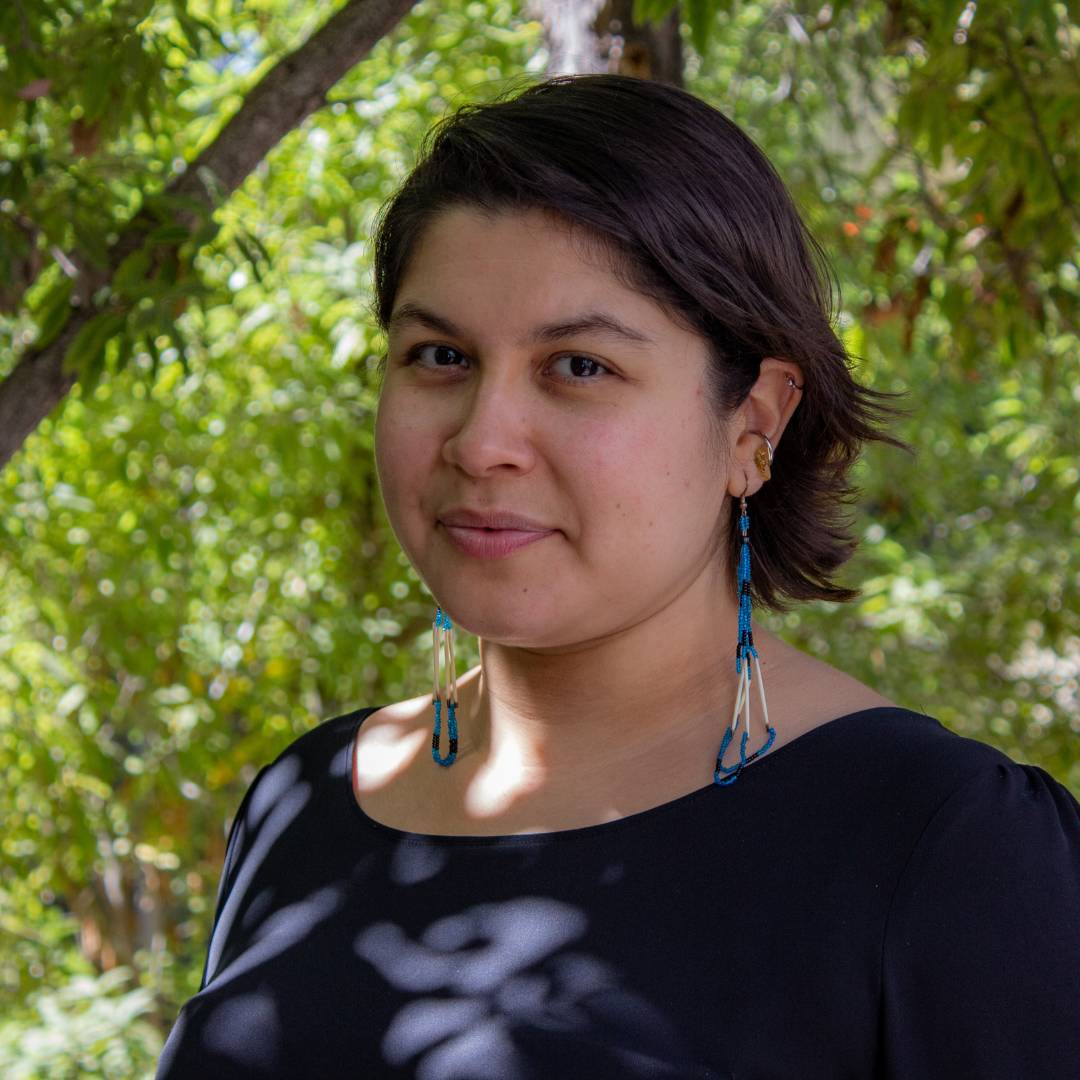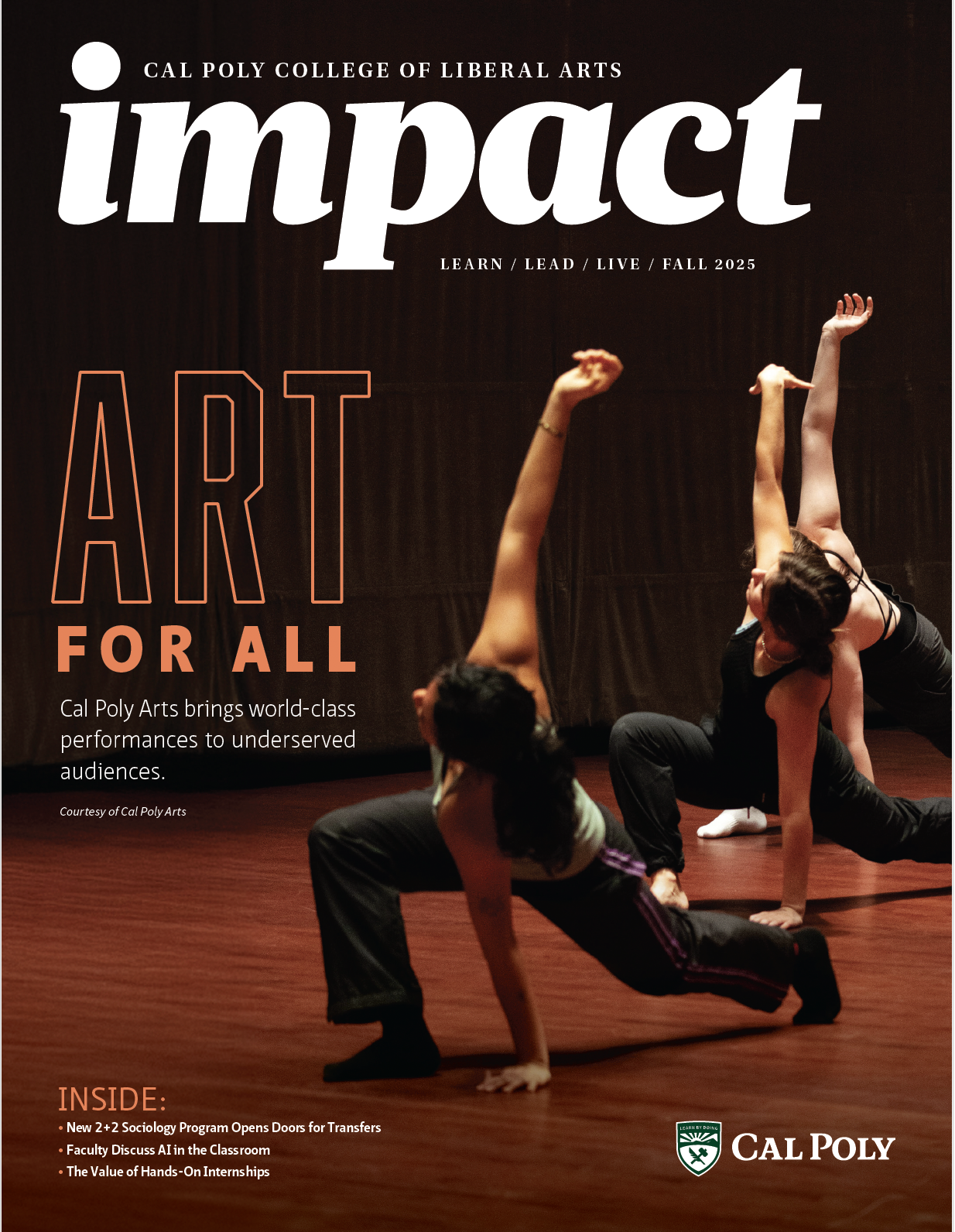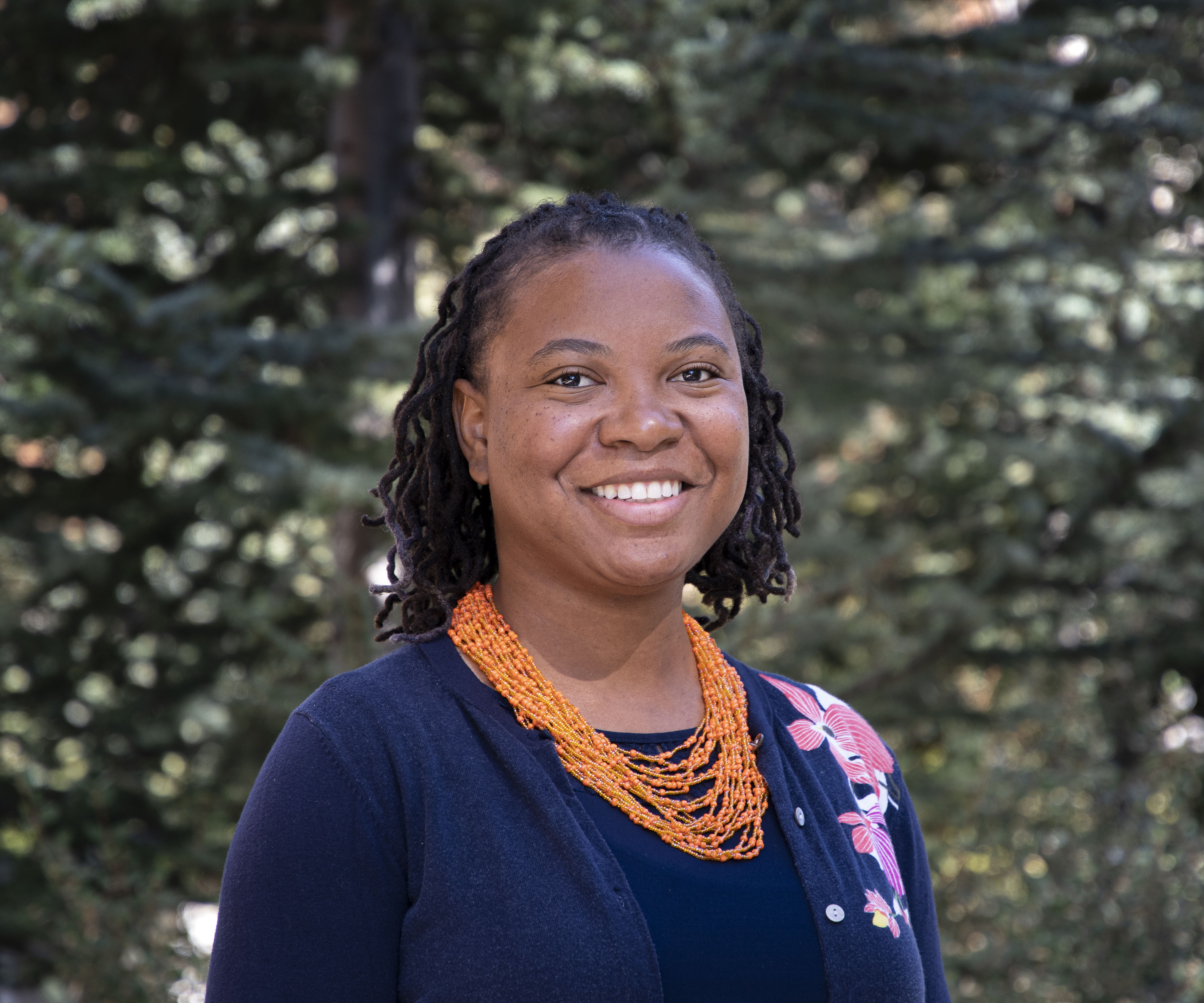Meet Five Faculty Members Making Room for Inclusion in Their Courses
By Keegan Koberl

The 2019 cluster hire cohort successfully
recruited 13 tenure-track professors.
In 2019, Cal Poly launched a university-wide push to increase diversity, equity and inclusion (DEI) efforts by hiring 13 tenure-track professors, in a move known as a DEI-focused cluster hire. The campuswide initiative followed the successful college-based DEI-focused cluster hire by the College of Liberal Arts in 2017.
These assistant professors, located across five colleges, focus on inclusive teaching strategies and more curricular coverage of areas related to diversity, equity and inclusion.
“There are many benefits to this effort, but one of the most immediate and impactful to our students is the DEI-related curricular expertise that these new faculty members can provide,” said Jennifer Teramoto Pedrotti, interim associate vice president for Academic Initiatives in the Office of University Diversity and Inclusion and the associate dean for Diversity and Curriculum in the College of Liberal Arts. “Our students are exposed to new, fresh ideas and concepts and learn from faculty members who are often on the cutting edge of their fields.”
Teramoto Pedrotti, who led the recruitment for the cluster hire, said she’s seen other faculty members who were hired around the same time also develop courses that focus on diversity, equity and inclusion. And there’s another cluster hire effort underway: in fall 2022, the College of Liberal Arts will welcome its third cluster hire, also college-based, with 10 new DEI-focused scholars in eight different CLA departments.
"It's great to see the continuation of the cluster hire program, " said Teramoto Pedrotti. "The level of expertise these scholars provide from their myriad identity perspectives is invaluable to our students and the college as a whole."
Recently, five members of the 2019 cluster hire spoke to Cal Poly News about the courses they’ve developed and taught at Cal Poly that promote diversity, equity, inclusion, and justice — in subjects ranging from architecture to mechanical engineering and beyond.
Dr. Shanae Aurora Martinez

Assistant Professor, English Department
Over the upcoming 2022-23 academic year, Martinez will pilot a three-quarter course sequence on editing and publishing for students interested in gaining hands-on experience in these fields.
“The idea for this course sequence came from my observations of the field and the ways in which English as a discipline can participate more directly in Learn by Doing,” Martinez said.
The first course in the sequence will introduce students to the field of literary editing and publishing. Throughout the fall quarter, students will develop their collective vision for the final publication they plan to produce by the end of the sequence. In the winter quarter, students will engage in editorial work according to their interests and skillsets. This includes soliciting submissions, grant writing, fundraising, and curating the future publication.
During the final course of the sequence — the lab portion — students will produce and distribute their final publication through the Book Arts Lab. The physical artifact will be archived in Cal Poly Special Collections and Archives, and the digital form will be available through Cal Poly Digital Commons.
The original form of the course sequence was developed over the 2020-2021 school year, when Martinez worked with two students, Eden Railsback and Juan Vergara, on an individualized version. Throughout that sequence, Railsback and Vergara developed their senior project: the inaugural edition of the Underground Anthology, a journal where BIPOC authors can share their creative works with the world.
The digital version of the Underground Anthology was submitted to and archived in the Cal Poly Digital Commons, but they had to forego the physical artifact because it would require meeting face-to-face during the COVID-19 pandemic.
Students taking the course in the upcoming year will create both digital and physical publications as well, and can contribute to Underground Anthology, the English Department literary journal Byzantium or develop their own micropublishing project.
“The goal of this course sequence is not to make English work for capitalism, but to teach students how to use the skills our field offers in ways that can question and disrupt the status quo,” Martinez said, adding that studying English gives students valuable critical thinking, creative and close reading skills they can apply to infinite situations.
“This course sequence can change as bookmaking changes and new formats for publishing are made possible in the digital landscape,” Martinez said. “I hope to offer this course sequence every year, but it need not be taught by me.
“I think the sequence would benefit from other approaches to editing and publishing. Diversity is always a strength.”

Dr. Padma Dorje Maitland
Assistant Professor, College of Architecture and Environmental Design
In Maitland’s course, The Architecture of Hope, students trace histories of hope displayed through art and architecture, especially in times of uncertainty.
Maitland designed the course in connection with the exhibition, “After Hope: Videos of Resistance,” he curated for the Asian Art Museum in San Francisco. The art exhibit examines hope’s potential to animate form, method and action through interdisciplinary means — which the students taking Maitland’s course engage with as well.
“I’m interested in course topics and curriculum that invite active imagination and which ask students to think about something that may not make immediate sense to them,” Maitland said. “I think this course is designed to prompt rethinking or critical inquiry around a topic rather than outlining or surveying that topic.”
Throughout the course, Maitland gives his students the opportunity to interact with the creators involved in the “After Hope” art exhibition. In the thick of the pandemic, he even developed virtual “field trips” for the students to engage with the artists and examine the subject of hope themselves, thanks to a Hearst Teacher-Scholar grant from the College of Architecture.
“Even though traveling during that time was not possible, I do feel the students were able to have a sort of international experience by spending time with these creative individuals,” said Maitland. “They were able to hear about expressions of hope from Taiwan, Turkey and artists who are working with various mediums and inspirations.”
During the course, students developed group projects that involved one student describing an experience in their life in which they did or did not feel hopeful and another student designing a postcard in response to illustrate that experience. The project, inspired by a workshop led by artists Gazelle Samizay and Labkhand Olfatmanesh, allowed students to further examine the subject through different art forms.
“It is exciting to be able to bring in this global worldview to the students and see how they interact – there’s a dynamism to the conversations and the exchange that I hope is a more unique experience for the students,” Maitland says. “As the class evolves, I hope that it can continue to speak to our current moment and be responsive to who the students are and where they are at in their lives.”
Maitland taught Architecture of Hope during the 2022 winter quarter and plans to offer the course again in the 2023 winter quarter.

Dr. Benjamin Lutz
Assistant Professor, Mechanical Engineering
Lutz explores how societal forces shape and are shaped by engineering designers and design processes in his class: Engineering, Design and Social Justice, which examines the ways in which design activities can promote or hinder efforts for social justice and equity.
“It's a lot of reading and familiarizing engineers with new ways of knowing and thinking about the world, and then using that knowledge in their projects,” Lutz said.
Lutz worked with a student assistant and a recent alum to choose readings and topics while developing the course in early 2021.
“We talked about what kind of questions are going to come up with students, what were they going to push back on, what they're going to be confused by, and we worked through some of these issues,” said Lutz. “Having a student and alum working in the industry is particularly helpful to identify what is important for students to know when they’re at Cal Poly and when they’re in the career after they graduate.”
One project, called product archaeology, asks students to pick an engineering artifact or design and work backwards to understand how it came to be. Students look at the context around the product’s development and environmental and economic factors that impacted the design process. Then they're asked to reimagine the product with a goal of creating something that would increase equity, justice and the wellbeing of society.
“It’s great to have a class that addresses such important issues and helps students grapple with those concepts,” Lutz said. “I think the material is most helpful to show students what things will look like when they’re working in the industry.
“I love this this class and think it's a really important one. It helps engineers really recognize the ways that they can impact society, how society impacts them and the relationships and complexities that are there between the two, especially as it pertains to them, making choices in design.”
Lutz taught Engineering, Design and Social Justice during the 2022 spring quarter and plans to offer the course again in spring of 2023.
“I wish everyone could take this class and that faculty can teach it from the perspective of their own fields – it’s fun and rewarding to see our students cross these conceptual thresholds.”
Dr. Joni Roberts
Assistant Professor, Kinesiology and Public Health
In Roberts’ Health 410: Global Health course, students focus on contemporary global health problems, disparities, national and international policies, health systems, and resource availability and utilization.
Roberts’ expertise and experience working internationally, combined with student interest in global health, allowed the course to be offered at Cal Poly: typically, public health courses offered at American universities focus on U.S. topics. The class focuses on low- and middle-income countries and looks at the impacts of colonialism, neo-colonialism and racism on health systems in these nations.
Roberts’ experience teaching the course virtually for two quarters due to the pandemic led her to redevelop the course in summer 2021 to better fit what students needed.
“In re-thinking the class, I did curricular training with colleagues teaching global health courses across the U.S. and we discussed best practices, what students need to know about global health and what worked for students in both quarter and semester systems,” said Roberts.
Roberts asks her students to review case studies, run simulations and put themselves in the place of people experiencing certain health situations across the world. She also has the students subscribe to a daily global health newsletter to help gain an understanding of current events in the field. Roberts chose not to heavily focus on the pandemic, despite the course taking place during it.
“My students already had the news and effects of the pandemic so ingrained in their lives, I didn’t feel that they needed another place to focus on it,” Roberts said. “However, as vaccinations became available, we started to look at vaccine distribution and availability across different countries, vaccination hesitancy and different types of vaccines, which can vary in different parts of the world.”
In the future, Roberts hopes she can expand student learning in these topics by offering study abroad and field experiences in the Global South and more middle- and low-income countries.
“Our students’ international experiences now often take them to places where health systems and infrastructure are similar to what they know in the United States – I think it would be extremely valuable for them to see how hospitals and health care facilities look and operate in other areas of the world.”
Roberts taught Health 410 during the 2022 winter and spring quarters and plans to offer the course again in the 2023 winter and spring quarters.

Dr. Tina Cheuk
Assistant Professor, School of Education
Cheuk’s course, Education 403: Developing Teachers of Color, focuses on developing and supporting aspiring teachers of color in elementary and secondary education.
“The course is tailored for students of color to reflect on their own educational experiences and racial barriers and issues they’ve encountered,” said Cheuk. “Those experiences are not random, but by design in how our educational system is structured.
“The students can reflect on moments they felt they didn’t belong and what we can do to change that in the teaching and teacher education fields,” Cheuk said.
Throughout the course, students discuss and explore structural factors associated with the systematic exclusion of teachers of color, their underrepresentation in schooling, resources that support teachers of color, and culturally sustaining pedagogies, which serve to bolster the culture of communities of color in schools. Cheuk’s students also look at news and current events regarding the teaching field and local community.
Though the course is focused on preparing future teachers, students don’t necessarily need to be set on their career path in order to take it.
“Even if you don’t become a teacher, this class and these conversations with your peers are still making you a more engaged and reflective citizen,” she added. “I hope that it gives students clarity in seeing the structural causes in students feeling excluded from certain spaces and roles – but ultimately it is up to the students what they do with this information.”
Cheuk also tailors the course to reflect the identities of her students. She hopes the course can provide a space for aspiring educators of color, who are not appropriately represented in the Californian teaching community.
“I want to get to know the students in the class and build a class that reflects who we all are,” she said. “I have selected reading from scholars who reflect identities of the students and include pictures of those scholars so the students can see themselves in the material and have another example that they do belong in this field.”
And having the course offered at Cal Poly shows that the educational field is moving in a more inclusive direction, Cheuk said. She taught the course in spring quarter and will offer it again in the 2023 spring quarter.
“Courses are policy and historical stamps – when a course is offered to students at Cal Poly, it shows that these are the topics we want to be thinking about and the experiences we want them to center and consider.”


